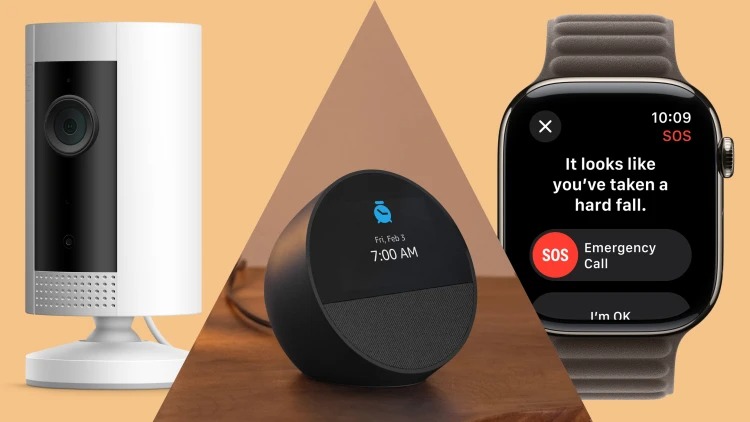- | 8:00 am
Tech can help you take care of your aging parents. Start with these 5 devices
From fall detection devices to cameras, here’s what you need to care for your older loved ones.

Most of us wish our parents would live as long as humanly possible, but some challenges arise if our wishes come true. While every individual is different, advanced aging usually brings about mobility issues and increased risk from things that may not have impacted us too much when we were younger, such as minor falls. The older a person gets, the more likely they will need care around the house and require more frequent observation.
Yet even though we may want to be there at all times, making sure they are okay, the simple fact is that work, other family commitments, and distance can limit our ability to provide care. Thankfully, while not at all a replacement for personal attention, there are now several pieces of everyday tech you can use to help make sure your aging parents are staying safe while also making their everyday lives more manageable in the process.
Smartwatches with fall detection, like the Apple Watch
As someone with an aging parent, the biggest thing I worry about is them having a fall. When we’re younger, tripping over a rug might just cause bruising and minor embarrassment. For an older person, the same accident can have devastating consequences—broken bones or even death. A 2023 Centers for Disease Control and Prevention report found that unintentional falls are the leading cause of injury-related deaths of adults 65 or older. In 2021 alone, 39,000 older adults in America died due to falls. That’s more than 106 fall-related deaths each day.
This is why I got my mom an Apple Watch. All Apple Watches have built-in fall detection. If a person stumbles, the Apple Watch can detect this, text all their emergency contacts, and call 911. Should your aging loved one fall, even alone, others will know they need help nearly instantly.
Recent Samsung Galaxy and Google Pixel watches, as well as other activity trackers, also offer fall detection.
Indoor security cameras like Ring
A security camera is probably the next best gadget for monitoring aging parents. Of course, this comes with privacy issues, and it’s critical to get your parents’ consent before you install one in their home.
What is particularly nice about many home security cameras, such as Amazon’s Ring system, is that they feature motion detection. If you can’t reach your parent, a camera’s motion alert can reveal where they were last seen. While it’s understandable that people may not want cameras surveilling them in every room of the house, it is worth talking with your parent to see if they would be willing to have cameras pointing at areas of particular risk—such as the bottom of a staircase or the driveway, where they are more likely to stumble and fall.
Item trackers like AirTags
Some people’s minds stay sharp their entire lives, but others may become more forgetful. If you find a parent telling you they always forget where they leave their keys or wallet, an item tracker, like Apple’s AirTag, is a nice, cheap gadget that could really help.
Item trackers can easily be attached to keys, purses, and remote controls. To locate an item, the user simply has to open the tracking app on their phone.
Smart plugs for lights and appliances
I once had a friend complain to me that whenever she went to her father’s house, she would find nearly every light on, whether it was 10 a.m. or 2 a.m. When she asked her father why, he said it was too much of a pain to go around the house turning them on and off every day (her father had mobility issues).
Leaving lights on around the clock can lead to electrical safety issues, though, not to mention increased energy costs. So my friend went out and bought smart plugs for nearly every lamp in her father’s house. A smart plug is a small adapter that plugs into an outlet. When you plug a lamp into it (or any other electrical device), you can turn it on or off via a simple tap in the associated smartphone app. They can be found on Amazon and in home improvement retailers like Home Depot.
My friend showed her father how to use the app, and the next time she visited, she says only the lights he needed were on. She even put a smart plug on his toaster oven so he could turn it off from the couch if he forgot to do so after cooking his meal.
Smart speakers like HomePods and Echos
A final gadget that can really help an aging parent around the house is a smart speaker, like Apple’s HomePod or Amazon’s Echo. Smart speakers are a repository of information that can be accessed using just your voice, and they can also help control other connected gadgets without having to get up.
For example, if you wirelessly connect your smart plugs to a smart speaker system, your parent can tell Alexa or Siri to turn on the lights in the dining room. Connecting smart plugs to a smart speaker system is usually as simple as scanning a QR code on the smart device with a phone’s camera, and once you’ve set it up, your parents won’t have to mess with connecting them again. The resulting voice control ability may be a better option than app-based controls for some people, especially if they find using a smartphone app cumbersome.
Smart speakers can also make it easier for aging parents to contact you or others should they want to talk or need help. For example, users can instruct a HomePod to text someone or even initiate a FaceTime audio call. If your parent has fallen and can’t get up, a smart speaker may allow them to use their voice to call for outside help.







































